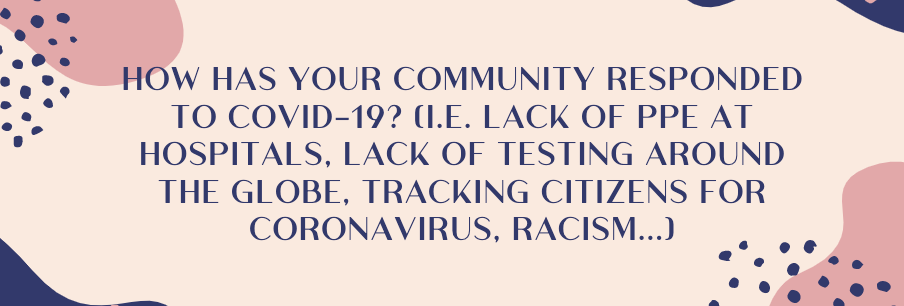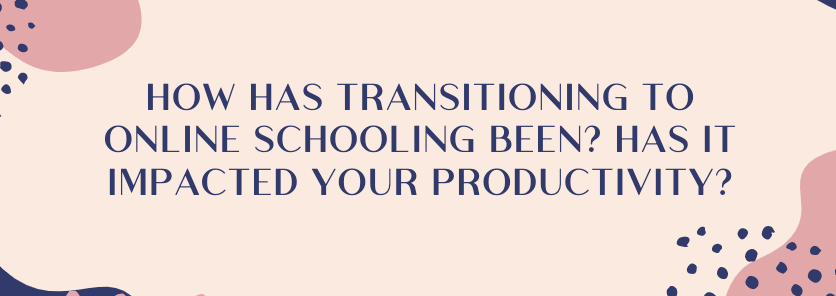In light of this difficult time, we asked our staff to answer a few questions and share their thoughts on this global pandemic, quarantine, local efforts and transnational combatting approaches. We hope to provide a platform for community support and urge folks to submit their work/thoughts to our open submissions form.

Amanda: I am back home in San Diego with my family. Going slightly crazy with staying inside and being around family 24/7 and taking online classes, but it’s a sacrifice we gotta pay to resolve this pandemic!!
Shayleen: I am self-quarantined with my family in Stockton, California. My daily routine consists of sleeping, eating, keeping up with lectures, and playing Animal Crossing. As an introvert, I enjoy spending time at home, but I do miss my friends!
Nisha:I am currently living at my parents’ house in Milpitas, CA. I readjusted my mindset after the first week of breakdowns and I’m liking quarantine because it allows me to be productive and just take a break from the rest of the world.
Abita: I’m currently at my parents’ house in Rancho Cucamonga, CA. I have been trying to keep myself motivated since I have more work now (extra classes since study abroad is cancelled), but I’m slowly getting used to it!
Phoebe: I get the wonderful opportunity of staying home in Castro Valley, CA. Everything is on lockdown, so don’t get too excited. My sister and my mom are with me, and we are just having a blast.
Rachael: I’m in Venice, California with my aunt and uncle. 🙂 Kind of miss my family at home though!
Emma: I’m at home with my parents and brother in San Jose, CA. We’re fortunate to be living in a pretty remote suburb, so we can go outside for exercise and groceries without putting ourselves at too much risk.
Lorraine: I’m in Foothill Ranch, CA with the rest of my family. I definitely have been taking too many breaks in between doing homework and my sleep schedule is messed up, but rather than that I’m pretty good.
Bryce: I am currently quarantined in Sacramento (the weather sucks here and I miss LA weather :(((((( ). However I am living with my family and it’s nice to see them again.
Azure: I am at my apartment near UCLA. My roommate is here so I’m not too lonely. My sleep schedule is awful but I’m trying to fix it lol. I’m hoping I can go back to NYC for the summer.
Ayushee: I am back in Singapore, with my family. It’s kind of nice to be back home in the midst of all this uncertainty, but the time difference really isn’t helping with the online transition. I left before finals, so it was kind of very abrupt and I miss just being able to walk down the hallway to see my friends.
Justin: I’m still at a friend’s house in LA. I’ve been enjoying the abundance of free time and flexibility of online lectures. I do miss home, however, as my flights get canceled repeatedly. Still, I appreciate the opportunity to explore a different part of LA and do fun experiments in the kitchen.
Snow: I am at my friend’s apartment in NY, but hope I could fly back home in May.
Zona: I am back at home in the Bay Area. It took a while to get used to taking classes online and staying on top of everything, but I’m starting to get the hang of it and I’ve just been facetiming to catch up with the friends and family that I can’t meet up with.
Kyla: I’m at my twin’s apartment in LA. Well technically it’s my apartment too LOL because I’ve been living here since last Summer.
Nur: I’m currently in Orange County at my parent’s house. It’s been nice having the comfort of my family during all the craziness. And since it’s been raining a lot, quarantining has actually been pretty enjoyable. I do however, really miss busy mornings, warm Westwood afternoons and walking past Royce at golden hour 🙁

Nisha: Race plays a role in the coronavirus because African Americans are dying at a higher rate compared to the rest of the population due to structural inequalities that are present. The population that lives in urban neighborhoods live in cramped spaces, leading to higher risk of contracting the disease. Moreover, low-income families struggle to find and pay for healthy food, and some families have been laid off due to the recession providing them with no income to sustain themselves during quarantine.
Azure: I just wanna bump everything that Nisha wrote ^^^^. Race literally plays a role in everything and this pandemic is no different. A lack of adequate healthcare and privatized companies make it so that testing is inaccessible, harming low-income communities. Also so many undocumented immigrants are unable to file for unemployment and receive governmental assistance because the nonprofit orgs that help them translate these forms now have to be remote, plus many of them do not have access to the internet. People are struggling to pay rent because they’ve been laid off from their jobs. Because socioeconomic status is intrinsically tied to race, this means that many of the families most vulnerable to the effects of COVID are low-income POC families.
Rachael: I think I heard a week or two ago that coronavirus was being called the Chinese virus? I think the whole coronavirus situation has attributed negative perceptions to certain races like ethnic Chinese.
Snow: I think people of color are at a disadvantaged position in this pandemic because there are statistics showing that people of color occupy a higher percentage of the population that’s below the poverty line. Some of them may be forced to continue working during the pandemic because they have to support the family, and staying out at this time could expose them to getting the coronavirus.
Phoebe: Problems associated with racism are definitely heightened during periods of stress. Those who have already been experiencing issues associated with their race only struggle more at this time. Environmental injustice issues, lack of resources to education, and other disparities are revealed here as people’s access to public resources are thinned. Additionally, the whole “Chinese Virus” thing is problematic. Asian American communities have definitely taken a hard hit, but it’s important to reflect that other communities have been facing issues of verbal and physical violence long before COVID-19. They have been the scapegoats for issues like crime or systemic inequities. Now, Asian Americans are the scapegoat for COVID-19.
Justin: Personally, I’ve been stared at at Whole Foods and been targeted by racial slurs. This ongoing pandemic definitely exposes the existing racial tensions in our society.
Kyla: In addition to what folks have said above, environmental racism means that Black, Indigenous, and other people of color are much more likely to be disabled (asthma, heart disease, etc.) which in turn makes COVID-19 more deadly. Susan Park at Revolutionario African Tacos has formed a nonprofit tackling how in places like LA environmental racism actually targets Asians the most. At the same time, these same communities face healthcare discrimination and lack of access to healthcare altogether. And while white Europeans and Americans are actually most culpable for spreading the virus in the US, the people being blamed by the public are largely East Asian and Black.
Nur: I think the experience of something as stressful and tragic as a pandemic leaves people with a lot of frustration and anger. Unfortunately many people feel the need to have someone to blame as an outlet for their feelings. Targeting ethnic groups and finding reasons to separate the community is the very last thing we need right now. Especially since we know certain ethnic groups have been more vulnerable to being exposed and impacted severely by COVID-19. These disparities have been present long before the pandemic and are now simply being highlighted due to systemic factors like income inequality and lack of access to resources.

Ayushee: Despite the situation having accelerated in the worst possible way in the last week or so, I think Singapore has been doing a pretty good job all around in terms of frequent testing, tracing new cases, and implementing strict stay-at-home measures for any at-risk community. That being said, I think now more than ever, the class inequality really stands out. I know that me and most of my friends are privileged enough to be staying at home and complaining about not being able to go outside or see each other, but there are so many people, especially foreign workers, who are being quarantined in less-than-ideal conditions.
Phoebe: Some businesses like Bopomofo Cafe are participating in the LA Mask Brigade by collecting PPE to donate to hospitals and other NGOs are trying to donate handmade masks, which is great! It was kind of a disaster that communities didn’t encourage people to wear non PPE face coverings however. I feel like this really contributed to the onset of disease. It might have to do with the cultural gap in the West vs East with masks. Our community’s local Safeway and Ranch 99 has also created designated shopping hours for at-risk citizens to protect them from disease. Businesses are still open for takeout but some are suffering. I feel for those whose livelihoods have been affected by the coronavirus whether that be losing access to educational resources, their source of living, etc.
Kyla: I’m wary of calling Los Angeles my community as I didn’t grow up here, but I’ve seen Los Angeles people organize food banks for food insecure and on the brink Asian elders, order bulk masks from the Garment Workers Union for local Asian organizations, and order food from Asian businesses to give to Asian elders to support small businesses who are struggling (Revolutionario African Tacos in South LA), protest continuing construction and development that is occurring in KTown and getting people occupying CalTrans homes soil so they can grow their own gardens (LA Worm Farm), baking people bread or getting food to people, organizing grocery runs and getting sanitization supplies to immunocompromised disabled people and elderly folks (Los Angeles People for People). Some of my friends are working to organize their buildings to get some form of rent relief or at least identify issues that the tenants are collectively facing under their landlord.
Bryce: A lot of places are still open for takeout, which kind of surprises me but I also understand why they are open. They need the money to keep their business alive, but it is definitely scary how so many businesses are closing and the unemployment is so high.
Snow: China took a very strict quarantine measure and some may think it’s too extreme, but it did slow down the virus pretty effectively. The government waived fees for testing/treating the coronavirus for most citizens, especially those who live in cities that have been hit particularly hard by the virus
Nur: I know OC is home to a lot of small businesses that are being hit hard right now. I do think it’s easier to comply with social distancing here than in LA since it’s a residential area where many people have their own homes or spacious apartments. I see people jogging and families going for walks in my neighborhood everyday which is honestly really refreshing and reassuring.

Azure: The transition to online school has made me so much more lazy. My sleep schedule is so messed up. Losing the social aspect of classes is hurting my productivity, since now it’s harder to meet people in classes and form study groups. It has also been hurting my productivity in nonacademic settings (without workshops, it’s hard to get motivated to practice dance). I am trying to be patient with myself — it will take time to fully transition, and I trust that I will get out of this funk soon.
Lorraine: It’s much different learning at home because I’m really comfortable at home and it’s harder to concentrate. Two of my professors prerecord their lectures which is nice, but then it allows me to procrastinate on watching them. I’m trying to get back into a routine soon though.
Emma: Because I anticipated having trouble with productivity and attention issues with online schooling, I established a stricter schedule and rules to keep myself in check and I might actually be more productive at home than on campus in some ways! Not being able to do club and other extracurricular activities at school has been difficult in terms of feeling personally fulfilled and socially supported, though. I’d say there’s no such thing as checking in too often with your friends and family.
Abita: Transitioning to online schooling has been a little bit more difficult than I anticipated. A lot of my classes have either had technical difficulties, have had people bombard classes, or some combination of the two. I tend to be more motivated and energized when I am around other people too, so being at home is definitely getting lonely and is making me more tired/less inclined to buckle down on work. I feel my productivity slipping a little bit but now that I am recognizing it, I’m getting better and am managing my time well now!
Nur: I’ve actually been pretty occupied since all my extracurriculars are still happening virtually and I’m taking quite a few classes. It’s been kind of stressful dealing with internet connectivity issues on top of the stress of transitioning to remote learning. But on a positive note, I don’t think remote learning is all that bad. It is kind of nice to attend lectures in the comfort of home and I find myself zoning out a lot less.
Zona: Transitioning to online school was strange at first, but I am starting to get used to it more. At first I kept submitting assignments late during Week 1 because I was confused with the due dates, but the TA was able to clarify all the deadlines for everyone and now it’s much easier to figure out when lectures and assignments are due. I think I’m not as productive as I was in school, but I’m trying to use my calendar more just to stay on top of all the work and meetings I have, even though we are in quarantine.
Shayleen: Transitioning to online schooling has definitely been challenging. I find it more demanding than taking in-person classes, because I need a lot more self-discipline and motivation to keep up with watching the lecture videos and understanding the class material. However, I am slowly adjusting by developing my own study schedule. Now I just have to stick to it!
Justin: Online lectures are probably the better part of this pandemic. I really like being able to attend lectures whenever I feel like to, and not having to sit in a lecture hall with 200 other people. What I do need to work on, though, is my procrastination issue. It’s hard to take everything seriously in the beginning. I’m looking forward to getting the most out of this quarter.
Kyla: I have more time as I’m not commuting, at the same time I’m struggling more with mental health due to the isolation and because I don’t have a schedule of going to school and work anymore. I really wish professors would be more empathetic and assign less homework rather than acting like this is business as usual, however.
Snow: All my classes are pre-recorded and my professors allow us to view the lectures at any time we want so transitioning to online classes is not difficult for me. But each class has a different participation method (e.g. post 1 question and 2 answers per week) and it could be hard to track. My productivity really depends on how good I can control myself not watching too much Netflix that day so I guess it could be a problem during the exam weeks.
Amanda: Transitioning has been really rough. It’s my senior year and the last thing I want to do is online classes where everything seems optional, but is actually mandatory. I definitely have a bad case of senioritis and I recently got into kpop, so all I want to do is just watch aesthetic music videos all day. Add to the fact that I am home with my family… My little brother games so our wifi is terrible and I do not have a desk to do any work. With that in mind, my productivity level is a work in progress.

Comments are closed.